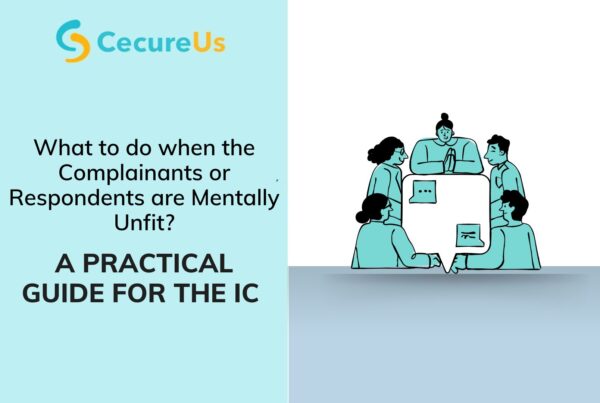
The Prevention of Sexual Harassment (PoSH) Act mandates organizations to establish an Internal Committee (IC) to address and redress complaints of sexual harassment at the workplace. However, having an IC in place is just the beginning. Proper documentation is critical for ensuring compliance, fostering transparency, and creating a safe workplace culture.
Who is responsible for maintaining these records?
The Internal Committee (IC), chaired by a senior female employee and comprising trained members, is primarily responsible for maintaining PoSH documentation. Additionally, the HR department or legal team may assist in maintaining and securely storing these records to ensure accessibility during audits or investigations. The IC must also collaborate with external consultants, if engaged, to document training, awareness, and compliance initiatives effectively.
Below, we explore the essential documentation, how to store it securely, and its categorization under prevention and redressal activities.
Storing PoSH Documentation: Online vs. Physical Records
- Storing Documents Physically
- Recommended Practices:
- Maintain individual case files or folders for every complaint or case.
- Store records in locked cabinets accessible only to authorized IC members.
- Use tamper-proof folders and secure storage areas that are fireproof and moisture-controlled.
- Advantages:
- Necessary for compliance with physical inspections and audits.
- Allows immediate access during on-site reviews.
- Challenges:
- Susceptible to physical damage, misplacement, or unauthorized access.
- Storing Documents Online
- Recommended Practices:
- Store records in encrypted cloud storage or secure internal servers.
- Maintain individual digital folders for each case or activity.
- Implement role-based access controls with multi-factor authentication.
- Regularly back up records to prevent loss during system failures.
- Advantages:
- Easily searchable and retrievable.
- Minimizes physical storage space and reduces the risk of physical damage.
- Challenges:
- Requires robust cybersecurity measures to prevent hacking or data breaches.
Best Practice:
Adopt a hybrid model where critical records are stored physically for compliance, while digital backups are maintained for operational convenience
Documentation for Audits: Focus on Prevention

Preventive measures form the backbone of a robust PoSH framework. Below is a checklist of records the IC should maintain to demonstrate proactive compliance during audits.
- Policy Documents
- The latest PoSH policy signed by the employer.
- Employee acknowledgment records confirming they’ve read the policy.
- Translations of the policy into local languages, if applicable.
- Training and Awareness Records
- Attendance sheets and feedback forms from PoSH awareness sessions.
- Certificates of completion for IC members’ training.
- Copies of training materials, such as slides, videos, or handouts.
- Refresher training schedules and attendance logs.
- Communication Records
- Posters displayed in common areas with details of the PoSH policy, IC members, and complaint submission process.
- Emails or memos sent to employees highlighting the organization’s zero-tolerance stance on harassment.
- Records of town halls, Q&A sessions, or other awareness initiatives.
- IC Constitution
- Appointment letters for IC members, including the external expert.
- Signed Non-Disclosure Agreements (NDAs) from IC members to ensure confidentiality.
- Credentials of IC members, including proof of training.
- Tenure details and conflict-of-interest declarations.
- Quarterly Review Meeting Minutes
Regular reviews by the IC help identify patterns, assess compliance, and recommend improvements to prevent harassment.
What to Maintain:
- Agendas of quarterly review meetings.
- Attendance records of IC members.
- Minutes summarizing:
- Number of complaints handled and resolved.
- Trends or recurring issues identified.
- Preventive measures implemented or proposed.
- Training needs for employees or IC members.
- Reports submitted to management with observations and recommendations.
- Annual Reports
- Comprehensive summaries of IC activities, including:
- Number of complaints received, resolved, or pending.
- Training sessions conducted.
- Systemic changes recommended to improve workplace safety.
- Submission records of the annual report to the employer and relevant authorities.
Documentation for Redressal: Handling Complaints
When addressing complaints, meticulous documentation is essential to ensure transparency and compliance.

These records should be maintained in individual case files or folders, either physically or digitally.
- Complaint Records
- Complaint forms submitted by employees, with timestamps.
- Acknowledgment receipts issued to the complainant.
- Any supporting documents or evidence provided by the complainant.
- Meeting Minutes
- Detailed minutes from IC meetings discussing the case.
- Attendance records of IC members during these meetings.
- Inquiry Reports
- Notices issued to the respondent and other involved parties.
- Statements recorded during the inquiry process.
- Comprehensive inquiry reports with findings and recommendations.
- Confidentiality Agreements
- NDAs signed by complainants, respondents, witnesses, and IC members.
- Logs of any confidentiality breaches and the actions taken to address them.
- Resolution Records
- Final resolution reports shared with complainants and respondents.
- Documentation of disciplinary actions implemented (if applicable).
- Proof of compliance with IC recommendations, such as reinstatements or written apologies.
- Post-Redressal Follow-Ups
- Logs of follow-ups with the complainant to ensure no retaliation occurred.
Periodic assessments of workplace safety and culture.
Conclusion
Maintaining accurate documentation under prevention, redressal, and review processes is essential for legal compliance and building trust among employees. By ensuring records are organized, securely stored, and reviewed regularly, the IC can foster a transparent and harassment-free workplace.
Take Action Today!
Audit your documentation practices to ensure compliance with the PoSH Act. Proactive record-keeping not only safeguards your organization during audits but also reinforces your commitment to workplace safety and inclusivity.
Please reach out to us for any queries on Essential Documentation for PoSH Committees.
For more blogs and articles, visit our official website. Contact us for workshops and queries related to POSH, EAP (Employee Assistance Program) , Diversity and Inclusion and Code Of Conduct.




